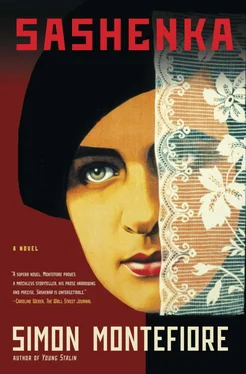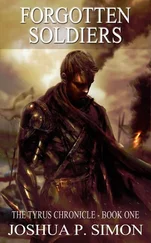“Nothing serious?” Sashenka saw his eyes narrow and hastened to reassure him. The Terror was over but even a proofing mistake could be dangerous. Vanya and Sashenka had not forgotten the fate of the typesetter who had put “Solin” (Man of Salt) instead of “Stalin” (Man of Steel).
“No, no, nothing like that, and then Carolina burned the pirozhki and Carlo sobbed…What’s all that?” she asked, pointing at the boxes in the car.
“Is it a present for me?” asked Carlo.
“Wait and see,” answered Vanya, laughing. He unhooked the leather strap across his barrel chest that was linked to his belt and gun holster, tossing everything to his driver, Razum. Throwing off his blue tunic, he whirled it round his head to reveal a white shirt and suspenders holding up blue trousers with red stripes tucked into boots. Returning to the car, he helped Razum, who wore the same uniform, to pull out three large parcels wrapped up in blue paper.
Razum was an old boxer with a broken nose. He was a real veteran with a scar on his right cheek that he claimed to have received from General Skuro himself in the Civil War (though Vanya joked that he actually got it by falling drunkenly through a pane of glass).
Placing the two smaller parcels by the car, Vanya and Razum slowly carried the third toward the house.
“Papochka!” Their five-year-old daughter, Snowy, holding a pink cushion, ran out of the house, in nothing but shorts, to hug her father. Vanya lifted her up in his arms and kissed her forehead.
“Look at me! Watch this, Daddy!” she said, waving her favorite cushion “friend” in the air.
“We’re always watching you,” replied Sashenka. “Show Daddy your cushion dance.”
Snowy was tall for her age, slim and very pale, hence her nickname, with blue eyes and rosy lips. Sashenka could not quite believe that such a beautiful creature had come from her and Vanya, although she looked a little like Sashenka’s father, the “former person” Samuil Zeitlin, ex-baron, ex-bloodsucker. Sashenka felt a sudden pang of sadness and could not help wondering where he was now. No one knew if he was among the living—and a Bolshevik did not ask.
Snowy kicked her legs high, waving the cushion and skipping like a colt. “Look, Papochka, do you like my new cushion dance?” She performed her crazy jig that always ended with “Giddy-gush, giddy-gush, giddy, giddy-up, giddy-gush!” Sashenka clapped. Vanya laughed. She could do no wrong in his eyes.
“Look!” Snowy pointed to a scarlet butterfly and pretended to fly after it, waving her hands as wings.
“You’ll be in the Bolshoi yet!” said Vanya. “An Artist of the People!”
Snowy ran back to her father, jumping up and down with much-treasured exuberance, and he picked her up again. He was so tall that her feet were far from the ground. “What have you been doing today, Snowy?”
“I’m not Snowy. Show us the presents, Papochka!”
“Volya then.”
Volya was her real name—it meant “Freedom” but also “Will,” a tribute to the People’s Will, an early revolutionary group—another good revolutionary name, reflected Sashenka, watching them indulgently.
She knew she was fortunate that Vanya was such a gentle father in this steely time of struggle when tenderness was not fashionable among the leaders, though Satinov had whispered to her that even Comrade Stalin did homework every night with his daughter Svetlana. Sashenka and Vanya were a real Soviet team, sharing the load when possible because both worked very hard, and they were both unusually affectionate parents. But then, as Comrade Kaganovich, Stalin’s trusted ally, had told her delegation of the Committee of Wives of Commanders, “Bringing up Soviet children is as important as liquidating spies or fighting Fascists, and a Soviet wife should care for her husband and children!”
An angular, beaky woman in sensible shoes and with her grey hair in a bun bustled after the little girl.
“You must put a hat on, Snowy,” scolded Carolina, the nanny, a Volga German who also cooked for the family, “or you’ll get sunburned like Carlo!”
Vanya put Snowy back on the ground. “Right, time to open the presents,” he said. “But first, this big one is for your lovely mother.” He and Razum heaved the bulky package onto the veranda. “There! Open it!”
“Can I open it?” said Snowy, jumping up and down.
“Can I open it?” cried Carlo, struggling out of his mother’s arms.
“Ask Mama!” said Vanya, smiling at Sashenka. “It’s her May Day present!”
“Of course you can,” said Sashenka.
“Come on then, Comrades Cushion and Bunny-Rabbit!” said their father. They tore at the paper until there in the blazing sun stood a voluptuous, cream-colored refrigerator with stainless steel trimmings and the words General Electric in chrome across its front. “Pleased, darling?”
Sashenka was delighted. An American fridge would make such a difference to their lives at the dacha, especially in this heat. She hugged Vanya, who tried to kiss her on the lips but she swerved slightly and he got her cheek instead. “Thank you, Vanya. But where on earth did you get it?”
“Well, it’s from the Narkom—the People’s Commissar—for our good work but he said that Comrade Stalin himself had approved the list.” Behind them the service staff—Razum the driver, Golavaty the Cossack groom with bow legs and a waxed mustache, Carolina the nanny and Artyom the old gardener—admired the American fridge.
But Snowy and Carlo were already tearing at the other parcels, to reveal a metal frame, wheels, handlebars…
“A bicycle!” cried Snowy.
“Oh, Snowy, just what you were hoping for on May Day!” said Sashenka, catching Vanya’s eye. “You really are a lovely daddy, thank you for all of this!” She took Snowy’s hand. “Snowy, say thank you to your wonderful papochka!”
“Not Snowy. My name is CUSHION! Thank you, Papochka!” Snowy scampered up to her father and leaned into his arms.
“You’ve got to thank the Party too and Comrade Stalin!” said Sashenka. But the children were already trying to balance on the bikes.
“Thank you, Comrade St…” Snowy lost interest and chased another butterfly while Carlo tried to cycle and fell off, which led to tears, cuddles and consoling ice cream indoors.
By midafternoon it was too hot to be outside and an oriole was singing. The silver pine forest that surrounded them buzzed with spring, voices murmured nearby, glasses tinkled, horses neighed.
Sashenka swung in the hammock, watching as Vanya, still in his boots and breeches but now bare chested, broad shouldered and muscular, worked with his tools to add training wheels to Carlo’s bike, cannibalizing parts from an old stroller. Sashenka marveled at his ingenuity—but of course he was a former lathe turner, a real worker since his childhood, and she remembered meeting him that first time at the safe house in Leningrad, when she was sixteen and he a little older. There had been no sentimental courtship or soppy proposal, Sashenka thought proudly, no bourgeois philistinism or rotten liberalism; they were too busy making a revolution. They had just agreed to get married, and had not even registered at the marriage office until the government had moved to Moscow. Then there’d been the civil war. She’d worked for the Party and taken evening classes at the Industrial College. She and Vanya had set off together into the countryside to squeeze the grain out of the obstinate peasants and collectivize their smallholdings. They shared digs at the House of the Soviets with other couples and owned nothing. I can’t believe, she thought now, that I’m almost forty already. The Smolny Institute for Noble Imbeciles seemed as distant as the Middle Ages.
Читать дальше












